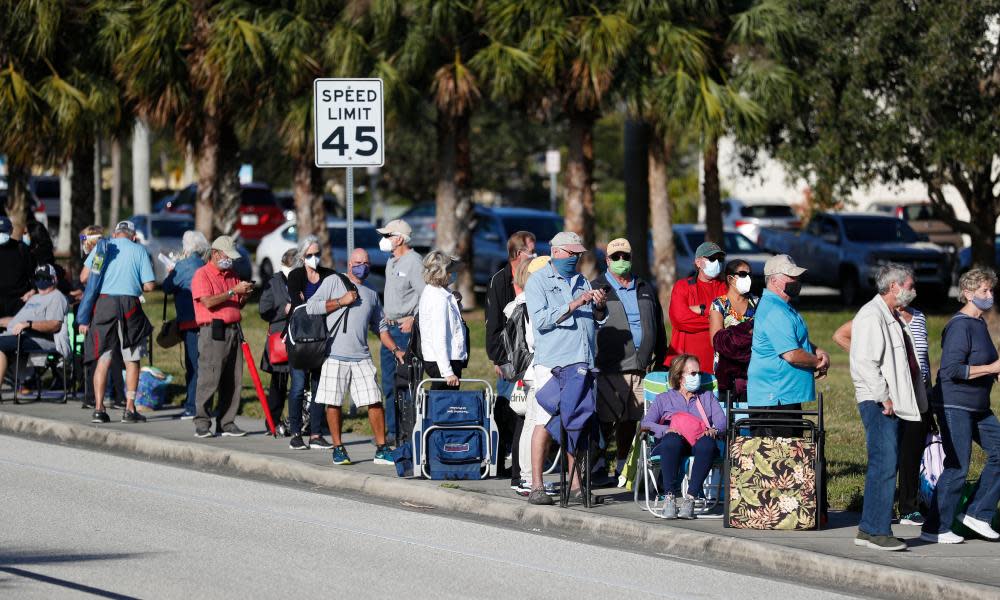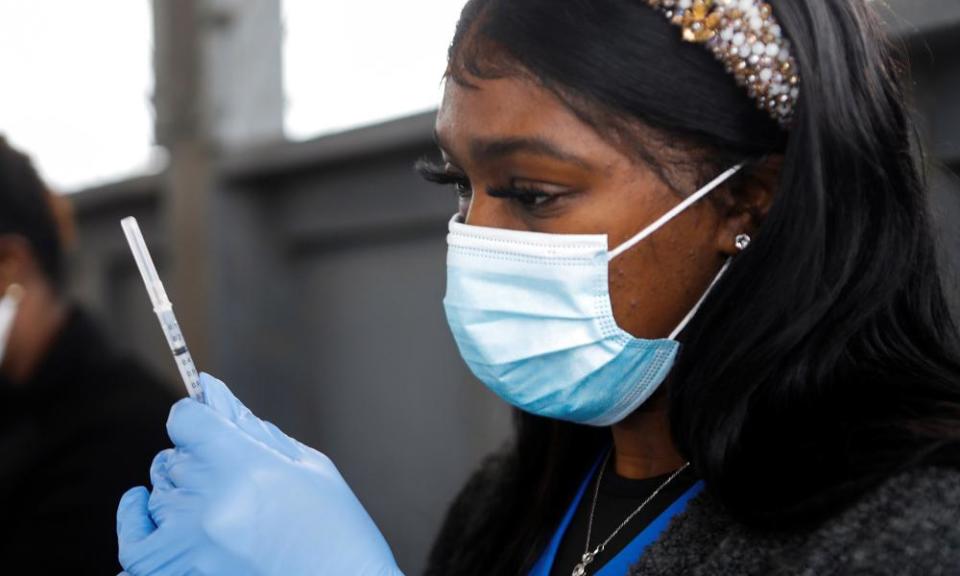'Vaccine tourism': tens of thousands of Americans cross state lines for injections

With more than 50 unique vaccination plans across the United States, one’s access to the Covid-19 vaccine depends in large part on where one lives. In Wisconsin, mink farmers are being considered for the next phase of vaccine prioritization. In New Jersey, smokers can get priority access to the vaccine. In Colorado, journalists fall under the category of frontline workers.
This complex system has given rise to a new type of pandemic travel – dubbed “vaccine tourism” – in which people cross state or even country lines to get earlier access. Without standardized protocol, and because of the fractured American health system, tens, if not hundreds, of thousands of people have gotten vaccines outside their home states.
“They are coming from Canada, Brazil, New York, Georgia, folks from Minneapolis have come here. Some friends of mine in St Petersburg [Florida] told me that they were in a vaccination line with people from Venezuela,” said Dr Jay Wolfson, a professor of public health at the University of South Florida.
He credits advertisements from international travel agencies with at least part of the vaccine tourist influx. “I get calls all the time from people saying, ‘Jay, can you get me in someplace?’ – and I can’t. And I won’t.”
Florida has been one of the most popular vaccine tourism destinations for domestic and international travelers alike, due to the state’s initial policy of vaccinating anyone over the age of 65 years old. The state recently implemented new ID rules in an attempt to direct more vaccines to Florida residents, but not before about 50,000 out-of-state recipients got a dose. Though some of these vaccine recipients are seasonal state residents, or snowbirds, whose decision to spend the winter in Florida was unrelated to their vaccination prospects, many thousands have come to the state just for a shot.
The 50,000 doses represent only about 3.4% of the total vaccinations administered in Florida, but even a small percentage going to out-of-state recipients in any state can affect the entire country’s vaccination infrastructure.
“Administering a vaccine dose involves appointments, involves needles, involves human resources. And all of those resources that are vehicles for delivering doses of the vaccine are tied to a local community, state, or city in terms of allocation,” said Dr Kyle Ferguson, a postdoctoral fellow in the division of medical ethics at the New York University Grossman School of Medicine.
Cities and states generally receive batches of the vaccine from the federal government based on the adult population in the area and plan their distribution strategy accordingly. When someone crosses city, state, or national lines to get a vaccine, it disrupts the success of both jurisdictions’ vaccine rollout.
Related: Biden says Congress needs to 'act now' on $1.9tn Covid relief proposal
“Vaccine tourists are using their power to create an unfair opportunity for themselves. There are design flaws that people are exploiting, taking advantage of some soft spots in those systems,” said Ferguson. “None of this should be about worthiness or deservingness, but when someone travels for the vaccine, they’re using resources, both doses and all the delivery mechanisms, that have been allocated to a different community.”
Vaccine tourism can also be risky for patients and healthcare providers. “If you give a dose of the vaccine to somebody who may not be able to return and get their second dose or if there’s an adverse event, who is responsible?” Wolfson asks. “Travelling long distances for a shot, there’s a risk to the patient of not fulfilling the dosage and of not being able to follow up with healthcare providers to have, what we call it in healthcare, continuity of care.”
Nevertheless, many are willing to take the risk, especially if they are particularly susceptible to health complications from the virus or don’t have to travel far to get vaccinated across a border.

One New York resident has seen several of her friends and family planning to cross state boundaries for vaccines. “My friend’s mom, a New York resident currently waiting out the pandemic in Florida, is driving to New Jersey for a vaccine in February,” she said. “She has high blood pressure and researched multiple states where she might be eligible for the vaccine and New Jersey fit the bill.”
Her brother, a teacher hoping to safely re-enter the classroom, had since-abandoned plans to travel from New York to New Jersey to get vaccinated under the state’s priority vaccination policy for teachers with pre-existing conditions. “There’s no burden of proof in New Jersey to show that you’re a former smoker, so it’s an easy loophole to exploit,” she said. Another family friend who is over 65 years old and immunocompromised, living in New Jersey, signed up to get the vaccine in New York due to a lack of available appointments in her home state.
Wolfson said these types of decisions were understandable, though not necessarily commendable, especially given widespread government mismanagement of the pandemic and the human instinct for self-preservation.
“When we have limited supplies of a highly in-demand, lifesaving product and people don’t even know how to get it or the phone lines are crowded and the computer signups aren’t working and they sit online at 3 o’clock in the morning at 85 years old waiting for the first dose to come out, that only reduces the amount of trust that people have in this system,” he said.
“The more you have inconsistency – with one state saying, ‘We’ll take smokers,’ and other state saying, ‘We’re not going to do prisoners,’ and politicians proudly jumping to the head of the line in many parts of the country – the less support you’re going to have for following the rules,” said Dr Arthur Caplan, a professor of bioethics at the NYU School of Medicine. “There is a little bit of excusable wiggle room for those in high-risk groups trying to protect themselves.”
But vaccine tourists who are able to cross state lines to get vaccinated are largely those with the means and ability to travel a distance – twice – for the vaccine and the technological savvy or connections to claim an appointment. This has contributed to racial and socioeconomic disparities in vaccine distribution so far: from New York to New Jersey to Chicago, vaccine recipients have been overwhelmingly white, residing in wealthier zip codes.
“The most important thing is: do not waste vaccines. I much prefer it going into somebody’s arm than a trash can,” said Caplan of the reality that some vaccine doses are going unclaimed at distribution sites across the country. “But we haven’t completed vaccinating healthcare workers and elderly people. So cutting in line in front of people who have greater risk of actually dying, often by people who are younger, can stay at home, quarantine, wear masks and protect themselves, that is to be condemned.”
Beyond these individual decisions, however, is a systemic problem, Caplan said. “What happened to the vaccine supply? How come we don’t know how much we got? There has been a huge leadership failure.”

